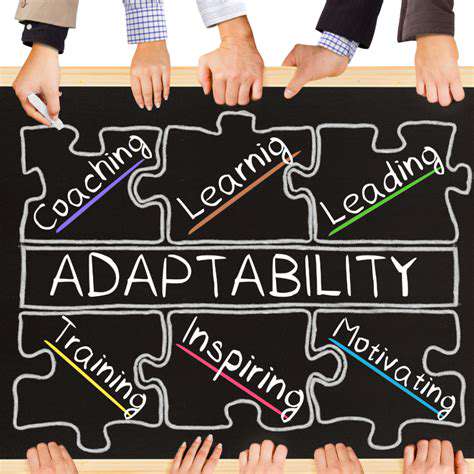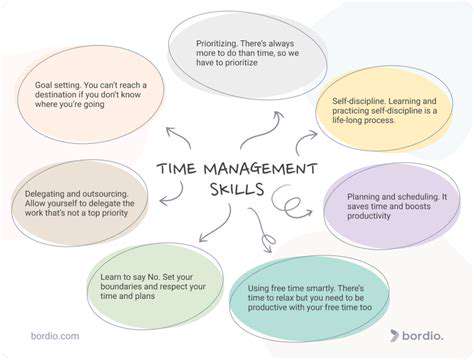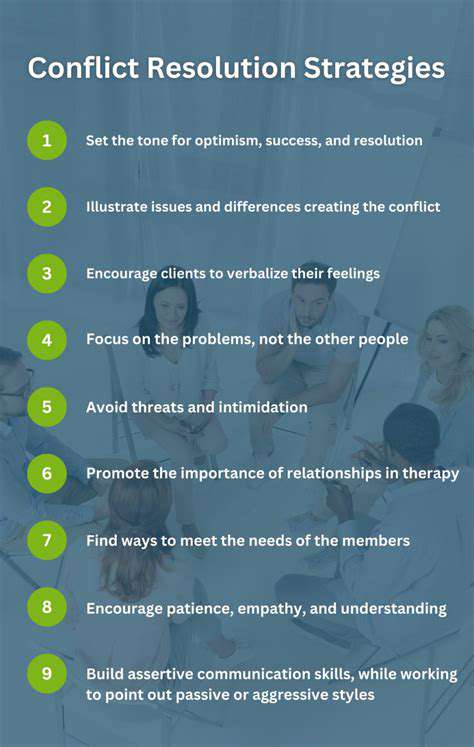Best Job Search Strategies for a Competitive Market
Mastering the Interview Process: From Preparation to Follow-Up
Preparing for Success
Thorough preparation is the cornerstone of a successful interview. This involves more than just researching the company; it's about understanding your own skills and experiences, and how they align with the specific role. Actively reflecting on past achievements and quantifying your contributions demonstrates tangible value, making your responses more impactful and memorable. Practice answering common interview questions, like Tell me about yourself and Why are you interested in this role? Anticipating potential questions and crafting compelling answers will significantly boost your confidence and poise during the interview.
Beyond the technical aspects, consider the environment. Familiarize yourself with the company culture, if possible. This demonstrates genuine interest and allows you to tailor your responses to resonate with the interviewer's expectations. Even a quick review of the company's social media presence and recent news can provide valuable insights that can be woven into your answers, showcasing your awareness and preparedness.
Navigating the Interview
During the interview, maintaining a professional demeanor and active listening are crucial. Maintain eye contact, actively listen to the interviewer's questions, and respond thoughtfully and concisely. Avoid rambling or providing vague answers. Instead, focus on providing specific examples to illustrate your skills and experiences. For instance, if asked about a time you faced a challenge, describe the situation, your actions, and the positive outcome. This structured approach will not only showcase your competency but also highlight your problem-solving abilities.
Remember to ask insightful questions at the end of the interview. This demonstrates your genuine interest in the role and the company, and allows you to gain a deeper understanding of the position. Prepared questions, demonstrating you've done your research, are significantly more effective than generic inquiries. Questions about the team dynamics, future projects, or the company's growth trajectory show initiative and a proactive approach.
Following Up Effectively
Immediately after the interview, send a thank-you note to the interviewer. This simple gesture reinforces your professionalism and demonstrates your appreciation for their time. Briefly reiterate your interest in the position and highlight key aspects of your qualifications that resonated with the interviewer's questions. This follow-up email, a crucial component of the job search process, is a powerful tool to maintain contact and keep your candidacy in mind.
Monitoring the interview process through appropriate channels is a strong strategy. If the interview process includes stages beyond the initial interaction, maintaining a polite and professional cadence, even if you haven't heard back immediately, is important. A follow-up email or a brief phone call, especially if the interview process is prolonged, can remind the hiring manager of your interest and qualifications without being intrusive or overly assertive. This continued engagement demonstrates a positive and persistent approach, enhancing your overall impression.
Reflection and Adaptation
After each interview, take time to reflect on your performance. Analyze what went well and what could be improved for future opportunities. Identify areas where you can strengthen your responses and refine your approach. This self-evaluation is an integral part of the learning process and is crucial for adapting your strategies to maximize your chances in subsequent interviews. This iterative approach, combining self-assessment with practical application, is key to mastering the interview process and ultimately landing your desired job.
Documenting your interview experiences, noting specific questions and responses, and analyzing your performance allows for targeted improvement. This meticulous approach to self-improvement significantly increases your chances of success in future interviews by highlighting areas for enhancement. By carefully reviewing and evaluating your performance, you can hone your skills and effectively showcase your abilities in subsequent job opportunities.
Staying Persistent and Adaptable in a Dynamic Market

Staying Focused on Your Goals
Maintaining a consistent focus on your goals, regardless of the challenges you face, is crucial for long-term success. It's easy to get sidetracked by distractions and setbacks, but persevering through these obstacles is key to achieving your aspirations. Understanding your motivations and regularly revisiting your goals can help you stay on track and maintain that laser-like focus that propels you forward.
Developing a strong sense of self-awareness is essential. Recognizing your personal strengths and weaknesses will allow you to leverage your talents while effectively addressing areas needing improvement. This self-awareness is a powerful tool for overcoming obstacles and adapting to changing circumstances.
Adapting to Change
Life is full of unexpected twists and turns, and the ability to adapt to change is a valuable skill. Embracing change as an opportunity for growth is a mindset shift that can greatly enhance your resilience. This means viewing challenges not as roadblocks but as opportunities to learn and develop new skills.
Flexibility and adaptability are critical in today's dynamic world. Being open to new ideas and approaches, and willing to adjust your strategies as needed, will be essential to success in any field.
Building Resilience
Resilience is the capacity to recover quickly from difficulties. It's about bouncing back from setbacks, learning from mistakes, and moving forward with renewed vigor. Cultivating resilience is a journey, not a destination, and it requires constant effort and a growth mindset.
Developing coping mechanisms for stress and adversity is an important part of building resilience. This could involve mindfulness practices, seeking support from others, or engaging in activities that promote relaxation and well-being.
Embracing Continuous Learning
In a constantly evolving world, continuous learning is paramount for staying relevant and successful. Seeking out new knowledge and skills, and applying them to your work or personal life, keeps you ahead of the curve and prepares you for future challenges. This could involve taking online courses, attending workshops, or simply reading industry publications.
A commitment to learning is a testament to your dedication to growth and improvement. This constant pursuit of knowledge is a hallmark of those who excel in all aspects of life.
Developing Problem-Solving Skills
Problem-solving skills are essential for navigating the complexities of life and work. Developing a systematic approach to identifying, analyzing, and resolving problems can enhance your decision-making abilities and improve outcomes. This involves breaking down complex issues into smaller, manageable parts and considering different perspectives.
The ability to think critically and creatively is vital for finding effective solutions to problems. Enhancing your critical thinking skills and engaging in creative problem-solving exercises can contribute significantly to your overall success.
Prioritizing Self-Care
Self-care is often overlooked but is crucial for maintaining both physical and mental well-being. Prioritizing your well-being allows you to approach challenges with a clearer mind and greater resilience. This encompasses activities that nourish your body and mind, such as exercise, healthy eating, sufficient sleep, and relaxation techniques.
Taking time for yourself to recharge and rejuvenate is not selfish, but rather a necessary investment in your overall well-being. A well-rested and cared-for individual is better equipped to handle challenges and maintain a positive outlook.
Overcoming Obstacles
Obstacles are inevitable in life, and overcoming them is a testament to your strength and perseverance. Learning to view obstacles as opportunities for growth and development is an important part of achieving your goals. By developing strategies for overcoming obstacles, you'll become more resilient and better equipped to navigate future challenges.
Failure is often a stepping stone to success. Learning from mistakes and adapting your approach allows you to overcome obstacles and achieve your desired outcomes. Resilience is cultivated through facing and overcoming obstacles, fostering personal growth and development.
Read more about Best Job Search Strategies for a Competitive Market
Hot Recommendations
- How to Stay Productive While Working Remotely
- Tips for Managing Conflict with Coworkers
- Entrance & Certification Exams (升学考试)
- How to Improve Your Storytelling Skills (Speaking)
- How to Find Profitable Side Hustles
- Tips for Preparing for the TOEFL iBT Home Edition
- Guide to Switching Careers from [Industry A] to [Industry B]
- How to Run an Effective Hybrid Meeting
- Tips for Marketing Your Side Hustle on Instagram











